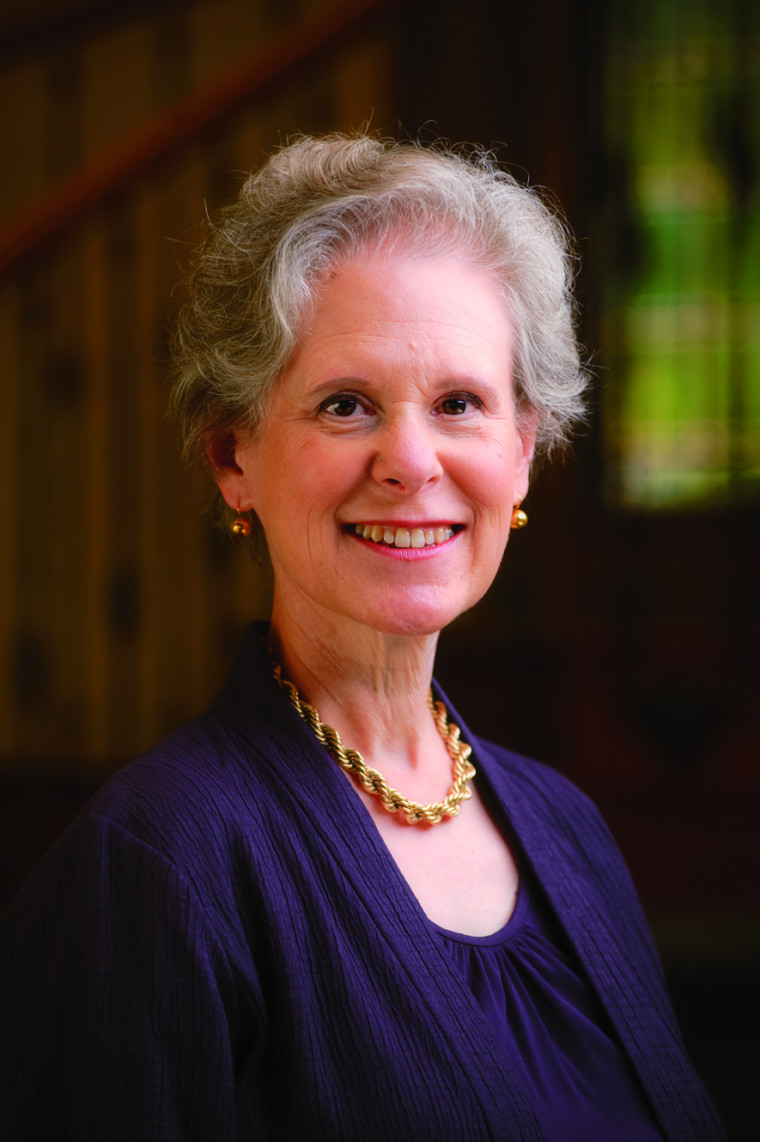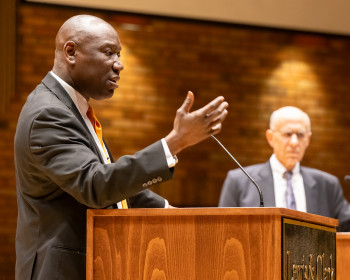Q&A with Provost Atkinson illuminates institution-wide accreditation process
Open gallery

The Institutional Planning and Effectiveness Committee, made up of students, faculty, and staff from across the institution, alumni, and members of the Board of Trustees, has been working on the first phase of a new seven year evaluation cycle for the Northwest Commission on Colleges and Universities (NWCCU), our institutional accrediting body. The Source connected with Provost Jane Atkinson to find out more.
Tell me about the online survey that students, faculty, and staff are being asked to fill out?
Lewis & Clark is preparing its first report for the Northwest Commission of Colleges and Universities as part of the Commission’s new institutional accreditation process. The initial step in this new process is to identify a set of “core themes” that are key to our mission, a list of objectives that derive from those themes, and indicators by which we can assess how well we are fulfilling our institutional purpose and goals.
The aim of the survey is to discover how closely the core themes and objectives that we’ve identified match the campus community’s sense of what Lewis & Clark stands for as an institution of higher learning.
Who drafted these core themes and objectives?
The draft was developed over the course of the fall by members of the newly formed Institutional Planning and Evaluation Committee (IPEC). IPEC includes faculty, staff, and students from the three schools, staff from the common services, and several members of the Board of Trustees:
Jane Atkinson, Vice President and Provost (chair)
George Battistel, Associate Vice President for Finance/Controller
Brian Blum, Professor/Associate Dean of Law Faculty
Tricia Brand, Associate Dean of Students/Director of Multicultural Affairs
Mervyn Brockett, Associate Provost
Jeff Feld-Gore, Associate Dean of Students
Scott Fletcher, Dean of the Graduate School/Professor of Education
Dewey Fowler, President of the Student Bar Association
Mariko Fukuyama, Graduate Student
Molly Galloway, Assistant Professor of Educational Leadership
Jane Hunter, Interim Dean of the College of Arts and Sciences
Trustee Jon Jaqua, CAS ’70, Chair of the Athletics Task Force
Dith Pamp, President of the Associated Students of Lewis & Clark
Trustee Ronald Ragen, Chairman of the Board of Trustees
Martha Spence, JD ’84, Associate Dean for Academic Affairs
Tom Stephenson, CAS ’02, Information Technology Field Technician I
Dan Terrio, Chief Technology Officer
Steven Tufte, Associate Professor of Physics
Amelia Wilcox, CAS ’81, President of the College of Arts & Sciences Board of Alumni
How are the proposed core themes and objectives supposed to apply to particular departments and programs?
They are intended to provide an overall framework or canopy that encompasses the education we offer to students across the three schools. No single department or program is necessarily going to demonstrate or emphasize all these elements. Rather, they represent at a general level what we are striving for as an institution.
Professional programs in the Law School and the Graduate School of Education and Counseling are accredited by separate organizations representing their fields. Does this accreditation process apply to those programs as well?
Yes. Institutional accreditation applies to the entire institution and to all the programs and degrees it offers. It provides national recognition of Lewis & Clark as an accredited institution of higher learning. Professional accreditation applies to specific programs and confirms that these programs have met the specific accreditation criteria of their national professional organizations. In fact, the standards and expectations for institutional and professional accreditation these days are quite congruent. Both place important emphasis on planning, implementation and assessment. The work that goes into our accreditation reports for the American Bar Association (ABA), the Association of American Law Schools (AALC), the National Council for Accreditation of Teacher Education (NCATE), the Commission for Accreditation of Marriage and Family Therapy Education (CAMFTE), the National Association of School Psychologists (NASP), and the Council for the Accreditation of Counseling and Related Educational Programs (CACREP) helps us to prepare our institutional accreditation report for the Northwest Commission (NWCCU).
What will IPEC do with the feedback it receives on the survey?
We will study closely both the quantitative results and the written comments and use them to refine the draft of the core themes. We’re very pleased by the thoughtful and constructive feedback we’ve received so far. We are also impressed by how many students have taken the time over break to respond to the survey.
Will the modified version of the core themes and objectives be “set in stone”?
No. As part of the new seven-year review cycle, every two years we will prepare a new section of our evaluation report. And when we do, we will have the opportunity to revise and update our mission, core themes, objectives, and indicators to reflect the current state of the institution.
Why is institutional accreditation important for Lewis & Clark?
Institutional accreditation is extremely important to us for two reasons. First, through the process of external peer review, it provides our own community and members of the wider public with a clear endorsement of the integrity and quality of the institution’s mission, educational programs, and administration. Secondly, it qualifies Lewis & Clark and its enrolled students for access to federal funds to support teaching, research and student financial aid.
For community members who have not done so already, what is the deadline to complete the survey?
We’d appreciate completion of this survey by January 15, 2011. Please write to provost@lclark.edu for more information.
email source@lclark.edu

